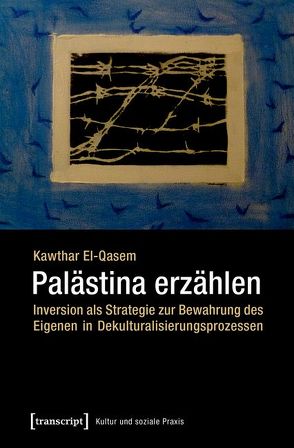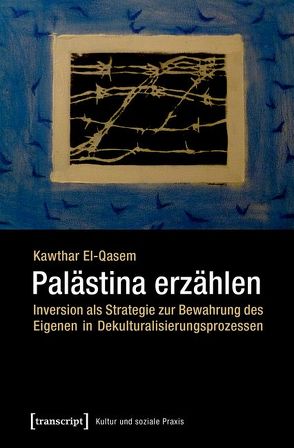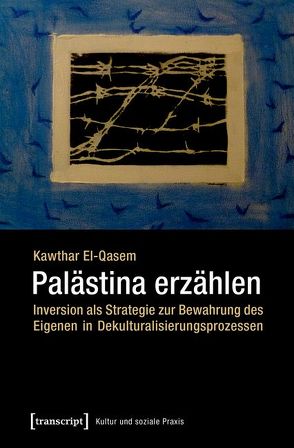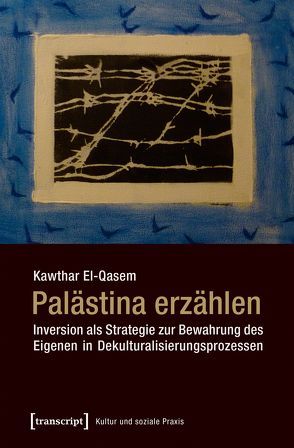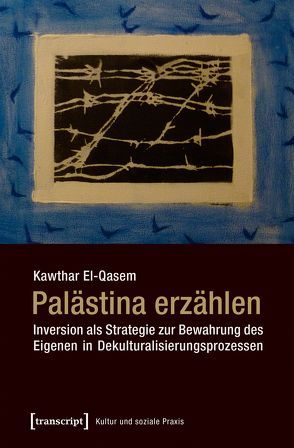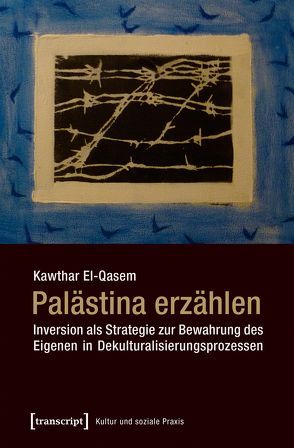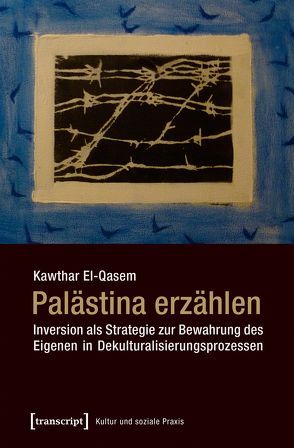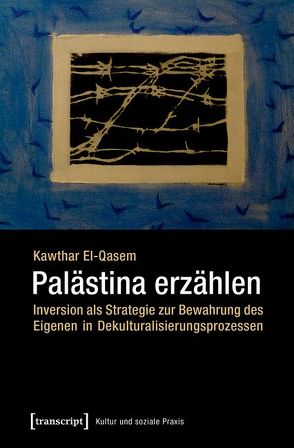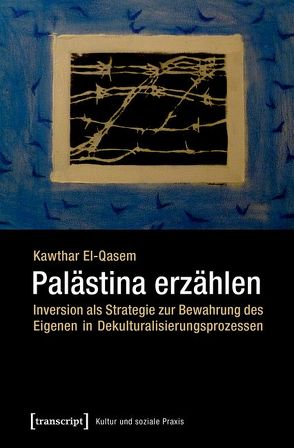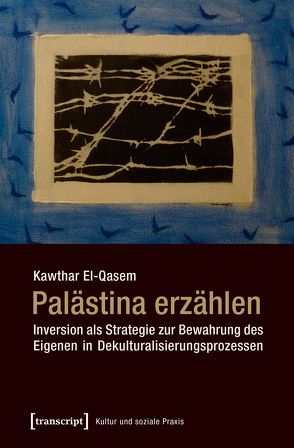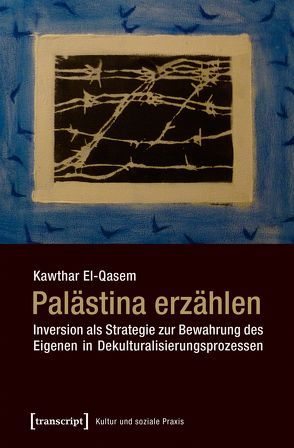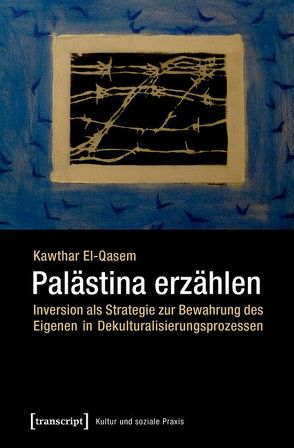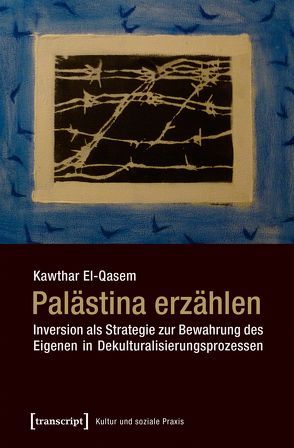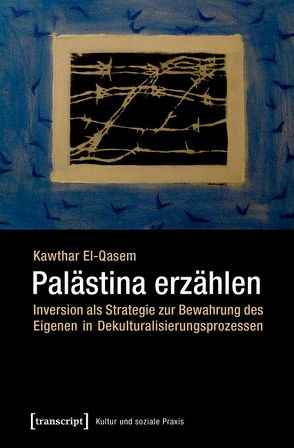Auf welche Strategien und Ressourcen greifen Menschen zurück, die von Benachteiligung, Ausgrenzung und Marginalisierung betroffen sind? »Palästina erzählen« geht dieser Frage nach und gewährt wertvolle Einblicke in die Praxis der palästinensischen mündlichen Überlieferung. Mit methodischer Gründlichkeit, kenntnisreicher Sensibilität und Kreativität arbeitet Kawthar El-Qasem das Phänomen der Inversion als Modus Operandi der Überlieferung heraus: Inversion bedeutet eine Vertauschbarkeit, mit der das Eigene (wieder-)hergestellt und weitergegeben werden kann. Mit der Erzählung wird ein Kippbild erzeugt, dem Umkehrbarkeit, Kontingenz und Transformation eingeschrieben sind. Das, was zwischen verschiedenen Deutungen liegt, wird dabei zur Ressource.
Aktualisiert: 2023-06-23
> findR *
Auf welche Strategien und Ressourcen greifen Menschen zurück, die von Benachteiligung, Ausgrenzung und Marginalisierung betroffen sind? »Palästina erzählen« geht dieser Frage nach und gewährt wertvolle Einblicke in die Praxis der palästinensischen mündlichen Überlieferung. Mit methodischer Gründlichkeit, kenntnisreicher Sensibilität und Kreativität arbeitet Kawthar El-Qasem das Phänomen der Inversion als Modus Operandi der Überlieferung heraus: Inversion bedeutet eine Vertauschbarkeit, mit der das Eigene (wieder-)hergestellt und weitergegeben werden kann. Mit der Erzählung wird ein Kippbild erzeugt, dem Umkehrbarkeit, Kontingenz und Transformation eingeschrieben sind. Das, was zwischen verschiedenen Deutungen liegt, wird dabei zur Ressource.
Aktualisiert: 2023-06-23
> findR *
Auf welche Strategien und Ressourcen greifen Menschen zurück, die von Benachteiligung, Ausgrenzung und Marginalisierung betroffen sind? »Palästina erzählen« geht dieser Frage nach und gewährt wertvolle Einblicke in die Praxis der palästinensischen mündlichen Überlieferung. Mit methodischer Gründlichkeit, kenntnisreicher Sensibilität und Kreativität arbeitet Kawthar El-Qasem das Phänomen der Inversion als Modus Operandi der Überlieferung heraus: Inversion bedeutet eine Vertauschbarkeit, mit der das Eigene (wieder-)hergestellt und weitergegeben werden kann. Mit der Erzählung wird ein Kippbild erzeugt, dem Umkehrbarkeit, Kontingenz und Transformation eingeschrieben sind. Das, was zwischen verschiedenen Deutungen liegt, wird dabei zur Ressource.
Aktualisiert: 2023-06-23
> findR *
Auf welche Strategien und Ressourcen greifen Menschen zurück, die von Benachteiligung, Ausgrenzung und Marginalisierung betroffen sind? »Palästina erzählen« geht dieser Frage nach und gewährt wertvolle Einblicke in die Praxis der palästinensischen mündlichen Überlieferung. Mit methodischer Gründlichkeit, kenntnisreicher Sensibilität und Kreativität arbeitet Kawthar El-Qasem das Phänomen der Inversion als Modus Operandi der Überlieferung heraus: Inversion bedeutet eine Vertauschbarkeit, mit der das Eigene (wieder-)hergestellt und weitergegeben werden kann. Mit der Erzählung wird ein Kippbild erzeugt, dem Umkehrbarkeit, Kontingenz und Transformation eingeschrieben sind. Das, was zwischen verschiedenen Deutungen liegt, wird dabei zur Ressource.
Aktualisiert: 2023-06-23
> findR *
Auf welche Strategien und Ressourcen greifen Menschen zurück, die von Benachteiligung, Ausgrenzung und Marginalisierung betroffen sind? »Palästina erzählen« geht dieser Frage nach und gewährt wertvolle Einblicke in die Praxis der palästinensischen mündlichen Überlieferung. Mit methodischer Gründlichkeit, kenntnisreicher Sensibilität und Kreativität arbeitet Kawthar El-Qasem das Phänomen der Inversion als Modus Operandi der Überlieferung heraus: Inversion bedeutet eine Vertauschbarkeit, mit der das Eigene (wieder-)hergestellt und weitergegeben werden kann. Mit der Erzählung wird ein Kippbild erzeugt, dem Umkehrbarkeit, Kontingenz und Transformation eingeschrieben sind. Das, was zwischen verschiedenen Deutungen liegt, wird dabei zur Ressource.
Aktualisiert: 2023-06-23
> findR *
Auf welche Strategien und Ressourcen greifen Menschen zurück, die von Benachteiligung, Ausgrenzung und Marginalisierung betroffen sind? »Palästina erzählen« geht dieser Frage nach und gewährt wertvolle Einblicke in die Praxis der palästinensischen mündlichen Überlieferung. Mit methodischer Gründlichkeit, kenntnisreicher Sensibilität und Kreativität arbeitet Kawthar El-Qasem das Phänomen der Inversion als Modus Operandi der Überlieferung heraus: Inversion bedeutet eine Vertauschbarkeit, mit der das Eigene (wieder-)hergestellt und weitergegeben werden kann. Mit der Erzählung wird ein Kippbild erzeugt, dem Umkehrbarkeit, Kontingenz und Transformation eingeschrieben sind. Das, was zwischen verschiedenen Deutungen liegt, wird dabei zur Ressource.
Aktualisiert: 2023-06-16
> findR *
Auf welche Strategien und Ressourcen greifen Menschen zurück, die von Benachteiligung, Ausgrenzung und Marginalisierung betroffen sind? »Palästina erzählen« geht dieser Frage nach und gewährt wertvolle Einblicke in die Praxis der palästinensischen mündlichen Überlieferung. Mit methodischer Gründlichkeit, kenntnisreicher Sensibilität und Kreativität arbeitet Kawthar El-Qasem das Phänomen der Inversion als Modus Operandi der Überlieferung heraus: Inversion bedeutet eine Vertauschbarkeit, mit der das Eigene (wieder-)hergestellt und weitergegeben werden kann. Mit der Erzählung wird ein Kippbild erzeugt, dem Umkehrbarkeit, Kontingenz und Transformation eingeschrieben sind. Das, was zwischen verschiedenen Deutungen liegt, wird dabei zur Ressource.
Aktualisiert: 2023-06-16
> findR *
Auf welche Strategien und Ressourcen greifen Menschen zurück, die von Benachteiligung, Ausgrenzung und Marginalisierung betroffen sind? »Palästina erzählen« geht dieser Frage nach und gewährt wertvolle Einblicke in die Praxis der palästinensischen mündlichen Überlieferung. Mit methodischer Gründlichkeit, kenntnisreicher Sensibilität und Kreativität arbeitet Kawthar El-Qasem das Phänomen der Inversion als Modus Operandi der Überlieferung heraus: Inversion bedeutet eine Vertauschbarkeit, mit der das Eigene (wieder-)hergestellt und weitergegeben werden kann. Mit der Erzählung wird ein Kippbild erzeugt, dem Umkehrbarkeit, Kontingenz und Transformation eingeschrieben sind. Das, was zwischen verschiedenen Deutungen liegt, wird dabei zur Ressource.
Aktualisiert: 2023-06-16
> findR *

ABSTRACTS
Bernhard Kleeberg/Andreas Langenohl: »Culturalisation, deculturalisation«
This article discusses variations in the analytic category of »culture« which has recently become prominent, with respect to ideal-typical idiomologies of deculturalisation as well as culturalisation. They are examined against the background of the systematic differentiations that are formulated in the renewed epistemic perspective of constructivism, deconstructivism and essentialism.
Pradeep Chakkarath: »Psychology and culture.On the problem of adequate understanding and method«
Taking psychology and its attempt to deal scientifically with the meaning of culture as an example, this article outlines the meaning of various historiographic narratives of disciplinary self-perception with regard to tensions between the natural and cultural sciences. The thesis postulates that these self-images are of psychological, especially cultural-psychological, importance. Only a psychology that includes aspects of the cultural sciences is able to deal with this vital aspect of the broader field.
Levent Tezcan: »Varieties of culturalisation«
The strong focus seen on »culture«, as it describes itself or is described, has lead to critical reflection on the term's ubiquitous use. In the current article various forms of »culturalisation« are traced and put in the context of a wider diagnosis of time, based on the example of the treatment of Muslim immigrants. Thereby, both the attribution of a collective identity and governmental strategies for the construction of an accountable Muslim community are examined. On the other hand, the attribution of a collective identity can be included in a modern theoretical programme that perceives the integration of a minority to be a cultural task. Finally, culturalisation arises, being explicitly used as a strategic argument in the interpretation of conflict insofar as it points out the »societal« causes of problem as an alternative to putting the emphasis on cultural origin.
Iris Därmann: »On the animal and the human.
Martin Heidegger, Jacques Derrida and the question of zoology«
This paper deals with the frontier between nature and culture, whose clearest form is seen is the designation of the border between animals and human beings. It has the character of a not yet established divide which can, as in Heidegger, be broken down to a hermeneutic abyss or, as in Derrida, be pluralised in asymmetrical standpoints and chiastic convolutions.
Anna Schober: »›Gender‹ and (a-)symmetry«
In recent years cultural definitions of »gender« have had extraordinary institutional success. This paper analyses visual worlds that have been motivated by constructivist gender concepts that often display a pronounced symmetry. It relates them to competing images which present difference as scandal, as a mirrored form of the self, or as figurations, and which politicize a-symmetrical forms. The study looks into the social condition of publicity that is constituted by such »picture acts«.
Anil Bhatti: »Similarity and difference in culture and cultural theory«
The concept of »similarity« lies at the centre of this interview with Anil Bhatti. Distinguishing itself from a culturalistic hermeneutic of the familiar and the strange, it concentrates on the »as-well-as«, on the area »between« theories of difference and such aspects of identity. Through the notions of »translation« and »over-lapping«, of »the vague« and »the preliminary« this concept seeks to ameliorate cultural theory.
Aktualisiert: 2023-06-16
> findR *
Auf welche Strategien und Ressourcen greifen Menschen zurück, die von Benachteiligung, Ausgrenzung und Marginalisierung betroffen sind? »Palästina erzählen« geht dieser Frage nach und gewährt wertvolle Einblicke in die Praxis der palästinensischen mündlichen Überlieferung. Mit methodischer Gründlichkeit, kenntnisreicher Sensibilität und Kreativität arbeitet Kawthar El-Qasem das Phänomen der Inversion als Modus Operandi der Überlieferung heraus: Inversion bedeutet eine Vertauschbarkeit, mit der das Eigene (wieder-)hergestellt und weitergegeben werden kann. Mit der Erzählung wird ein Kippbild erzeugt, dem Umkehrbarkeit, Kontingenz und Transformation eingeschrieben sind. Das, was zwischen verschiedenen Deutungen liegt, wird dabei zur Ressource.
Aktualisiert: 2023-06-09
> findR *
Auf welche Strategien und Ressourcen greifen Menschen zurück, die von Benachteiligung, Ausgrenzung und Marginalisierung betroffen sind? »Palästina erzählen« geht dieser Frage nach und gewährt wertvolle Einblicke in die Praxis der palästinensischen mündlichen Überlieferung. Mit methodischer Gründlichkeit, kenntnisreicher Sensibilität und Kreativität arbeitet Kawthar El-Qasem das Phänomen der Inversion als Modus Operandi der Überlieferung heraus: Inversion bedeutet eine Vertauschbarkeit, mit der das Eigene (wieder-)hergestellt und weitergegeben werden kann. Mit der Erzählung wird ein Kippbild erzeugt, dem Umkehrbarkeit, Kontingenz und Transformation eingeschrieben sind. Das, was zwischen verschiedenen Deutungen liegt, wird dabei zur Ressource.
Aktualisiert: 2023-06-09
> findR *
Auf welche Strategien und Ressourcen greifen Menschen zurück, die von Benachteiligung, Ausgrenzung und Marginalisierung betroffen sind? »Palästina erzählen« geht dieser Frage nach und gewährt wertvolle Einblicke in die Praxis der palästinensischen mündlichen Überlieferung. Mit methodischer Gründlichkeit, kenntnisreicher Sensibilität und Kreativität arbeitet Kawthar El-Qasem das Phänomen der Inversion als Modus Operandi der Überlieferung heraus: Inversion bedeutet eine Vertauschbarkeit, mit der das Eigene (wieder-)hergestellt und weitergegeben werden kann. Mit der Erzählung wird ein Kippbild erzeugt, dem Umkehrbarkeit, Kontingenz und Transformation eingeschrieben sind. Das, was zwischen verschiedenen Deutungen liegt, wird dabei zur Ressource.
Aktualisiert: 2023-06-02
> findR *
Auf welche Strategien und Ressourcen greifen Menschen zurück, die von Benachteiligung, Ausgrenzung und Marginalisierung betroffen sind? »Palästina erzählen« geht dieser Frage nach und gewährt wertvolle Einblicke in die Praxis der palästinensischen mündlichen Überlieferung. Mit methodischer Gründlichkeit, kenntnisreicher Sensibilität und Kreativität arbeitet Kawthar El-Qasem das Phänomen der Inversion als Modus Operandi der Überlieferung heraus: Inversion bedeutet eine Vertauschbarkeit, mit der das Eigene (wieder-)hergestellt und weitergegeben werden kann. Mit der Erzählung wird ein Kippbild erzeugt, dem Umkehrbarkeit, Kontingenz und Transformation eingeschrieben sind. Das, was zwischen verschiedenen Deutungen liegt, wird dabei zur Ressource.
Aktualisiert: 2023-06-02
> findR *
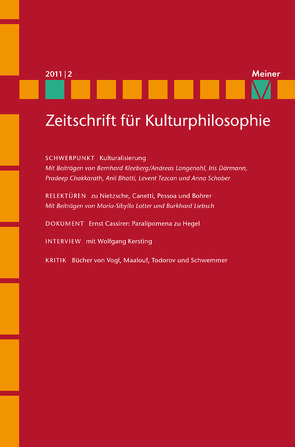
ABSTRACTS
Bernhard Kleeberg/Andreas Langenohl: »Culturalisation, deculturalisation«
This article discusses variations in the analytic category of »culture« which has recently become prominent, with respect to ideal-typical idiomologies of deculturalisation as well as culturalisation. They are examined against the background of the systematic differentiations that are formulated in the renewed epistemic perspective of constructivism, deconstructivism and essentialism.
Pradeep Chakkarath: »Psychology and culture.On the problem of adequate understanding and method«
Taking psychology and its attempt to deal scientifically with the meaning of culture as an example, this article outlines the meaning of various historiographic narratives of disciplinary self-perception with regard to tensions between the natural and cultural sciences. The thesis postulates that these self-images are of psychological, especially cultural-psychological, importance. Only a psychology that includes aspects of the cultural sciences is able to deal with this vital aspect of the broader field.
Levent Tezcan: »Varieties of culturalisation«
The strong focus seen on »culture«, as it describes itself or is described, has lead to critical reflection on the term's ubiquitous use. In the current article various forms of »culturalisation« are traced and put in the context of a wider diagnosis of time, based on the example of the treatment of Muslim immigrants. Thereby, both the attribution of a collective identity and governmental strategies for the construction of an accountable Muslim community are examined. On the other hand, the attribution of a collective identity can be included in a modern theoretical programme that perceives the integration of a minority to be a cultural task. Finally, culturalisation arises, being explicitly used as a strategic argument in the interpretation of conflict insofar as it points out the »societal« causes of problem as an alternative to putting the emphasis on cultural origin.
Iris Därmann: »On the animal and the human.
Martin Heidegger, Jacques Derrida and the question of zoology«
This paper deals with the frontier between nature and culture, whose clearest form is seen is the designation of the border between animals and human beings. It has the character of a not yet established divide which can, as in Heidegger, be broken down to a hermeneutic abyss or, as in Derrida, be pluralised in asymmetrical standpoints and chiastic convolutions.
Anna Schober: »›Gender‹ and (a-)symmetry«
In recent years cultural definitions of »gender« have had extraordinary institutional success. This paper analyses visual worlds that have been motivated by constructivist gender concepts that often display a pronounced symmetry. It relates them to competing images which present difference as scandal, as a mirrored form of the self, or as figurations, and which politicize a-symmetrical forms. The study looks into the social condition of publicity that is constituted by such »picture acts«.
Anil Bhatti: »Similarity and difference in culture and cultural theory«
The concept of »similarity« lies at the centre of this interview with Anil Bhatti. Distinguishing itself from a culturalistic hermeneutic of the familiar and the strange, it concentrates on the »as-well-as«, on the area »between« theories of difference and such aspects of identity. Through the notions of »translation« and »over-lapping«, of »the vague« and »the preliminary« this concept seeks to ameliorate cultural theory.
Aktualisiert: 2023-05-21
> findR *
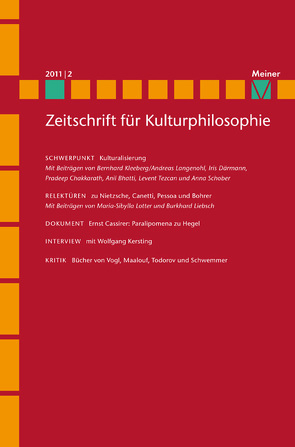
ABSTRACTS
Bernhard Kleeberg/Andreas Langenohl: »Culturalisation, deculturalisation«
This article discusses variations in the analytic category of »culture« which has recently become prominent, with respect to ideal-typical idiomologies of deculturalisation as well as culturalisation. They are examined against the background of the systematic differentiations that are formulated in the renewed epistemic perspective of constructivism, deconstructivism and essentialism.
Pradeep Chakkarath: »Psychology and culture.On the problem of adequate understanding and method«
Taking psychology and its attempt to deal scientifically with the meaning of culture as an example, this article outlines the meaning of various historiographic narratives of disciplinary self-perception with regard to tensions between the natural and cultural sciences. The thesis postulates that these self-images are of psychological, especially cultural-psychological, importance. Only a psychology that includes aspects of the cultural sciences is able to deal with this vital aspect of the broader field.
Levent Tezcan: »Varieties of culturalisation«
The strong focus seen on »culture«, as it describes itself or is described, has lead to critical reflection on the term's ubiquitous use. In the current article various forms of »culturalisation« are traced and put in the context of a wider diagnosis of time, based on the example of the treatment of Muslim immigrants. Thereby, both the attribution of a collective identity and governmental strategies for the construction of an accountable Muslim community are examined. On the other hand, the attribution of a collective identity can be included in a modern theoretical programme that perceives the integration of a minority to be a cultural task. Finally, culturalisation arises, being explicitly used as a strategic argument in the interpretation of conflict insofar as it points out the »societal« causes of problem as an alternative to putting the emphasis on cultural origin.
Iris Därmann: »On the animal and the human.
Martin Heidegger, Jacques Derrida and the question of zoology«
This paper deals with the frontier between nature and culture, whose clearest form is seen is the designation of the border between animals and human beings. It has the character of a not yet established divide which can, as in Heidegger, be broken down to a hermeneutic abyss or, as in Derrida, be pluralised in asymmetrical standpoints and chiastic convolutions.
Anna Schober: »›Gender‹ and (a-)symmetry«
In recent years cultural definitions of »gender« have had extraordinary institutional success. This paper analyses visual worlds that have been motivated by constructivist gender concepts that often display a pronounced symmetry. It relates them to competing images which present difference as scandal, as a mirrored form of the self, or as figurations, and which politicize a-symmetrical forms. The study looks into the social condition of publicity that is constituted by such »picture acts«.
Anil Bhatti: »Similarity and difference in culture and cultural theory«
The concept of »similarity« lies at the centre of this interview with Anil Bhatti. Distinguishing itself from a culturalistic hermeneutic of the familiar and the strange, it concentrates on the »as-well-as«, on the area »between« theories of difference and such aspects of identity. Through the notions of »translation« and »over-lapping«, of »the vague« and »the preliminary« this concept seeks to ameliorate cultural theory.
Aktualisiert: 2023-05-19
> findR *
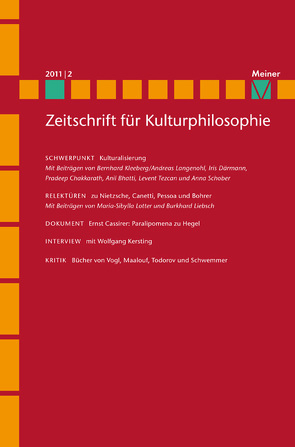
ABSTRACTS
Bernhard Kleeberg/Andreas Langenohl: »Culturalisation, deculturalisation«
This article discusses variations in the analytic category of »culture« which has recently become prominent, with respect to ideal-typical idiomologies of deculturalisation as well as culturalisation. They are examined against the background of the systematic differentiations that are formulated in the renewed epistemic perspective of constructivism, deconstructivism and essentialism.
Pradeep Chakkarath: »Psychology and culture.On the problem of adequate understanding and method«
Taking psychology and its attempt to deal scientifically with the meaning of culture as an example, this article outlines the meaning of various historiographic narratives of disciplinary self-perception with regard to tensions between the natural and cultural sciences. The thesis postulates that these self-images are of psychological, especially cultural-psychological, importance. Only a psychology that includes aspects of the cultural sciences is able to deal with this vital aspect of the broader field.
Levent Tezcan: »Varieties of culturalisation«
The strong focus seen on »culture«, as it describes itself or is described, has lead to critical reflection on the term's ubiquitous use. In the current article various forms of »culturalisation« are traced and put in the context of a wider diagnosis of time, based on the example of the treatment of Muslim immigrants. Thereby, both the attribution of a collective identity and governmental strategies for the construction of an accountable Muslim community are examined. On the other hand, the attribution of a collective identity can be included in a modern theoretical programme that perceives the integration of a minority to be a cultural task. Finally, culturalisation arises, being explicitly used as a strategic argument in the interpretation of conflict insofar as it points out the »societal« causes of problem as an alternative to putting the emphasis on cultural origin.
Iris Därmann: »On the animal and the human.
Martin Heidegger, Jacques Derrida and the question of zoology«
This paper deals with the frontier between nature and culture, whose clearest form is seen is the designation of the border between animals and human beings. It has the character of a not yet established divide which can, as in Heidegger, be broken down to a hermeneutic abyss or, as in Derrida, be pluralised in asymmetrical standpoints and chiastic convolutions.
Anna Schober: »›Gender‹ and (a-)symmetry«
In recent years cultural definitions of »gender« have had extraordinary institutional success. This paper analyses visual worlds that have been motivated by constructivist gender concepts that often display a pronounced symmetry. It relates them to competing images which present difference as scandal, as a mirrored form of the self, or as figurations, and which politicize a-symmetrical forms. The study looks into the social condition of publicity that is constituted by such »picture acts«.
Anil Bhatti: »Similarity and difference in culture and cultural theory«
The concept of »similarity« lies at the centre of this interview with Anil Bhatti. Distinguishing itself from a culturalistic hermeneutic of the familiar and the strange, it concentrates on the »as-well-as«, on the area »between« theories of difference and such aspects of identity. Through the notions of »translation« and »over-lapping«, of »the vague« and »the preliminary« this concept seeks to ameliorate cultural theory.
Aktualisiert: 2023-05-17
> findR *
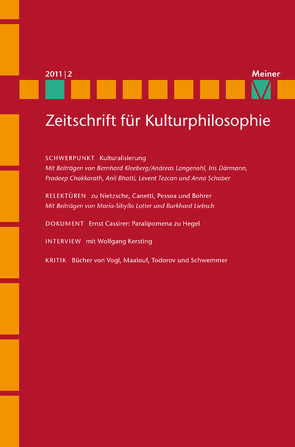
ABSTRACTS
Bernhard Kleeberg/Andreas Langenohl: »Culturalisation, deculturalisation«
This article discusses variations in the analytic category of »culture« which has recently become prominent, with respect to ideal-typical idiomologies of deculturalisation as well as culturalisation. They are examined against the background of the systematic differentiations that are formulated in the renewed epistemic perspective of constructivism, deconstructivism and essentialism.
Pradeep Chakkarath: »Psychology and culture.On the problem of adequate understanding and method«
Taking psychology and its attempt to deal scientifically with the meaning of culture as an example, this article outlines the meaning of various historiographic narratives of disciplinary self-perception with regard to tensions between the natural and cultural sciences. The thesis postulates that these self-images are of psychological, especially cultural-psychological, importance. Only a psychology that includes aspects of the cultural sciences is able to deal with this vital aspect of the broader field.
Levent Tezcan: »Varieties of culturalisation«
The strong focus seen on »culture«, as it describes itself or is described, has lead to critical reflection on the term's ubiquitous use. In the current article various forms of »culturalisation« are traced and put in the context of a wider diagnosis of time, based on the example of the treatment of Muslim immigrants. Thereby, both the attribution of a collective identity and governmental strategies for the construction of an accountable Muslim community are examined. On the other hand, the attribution of a collective identity can be included in a modern theoretical programme that perceives the integration of a minority to be a cultural task. Finally, culturalisation arises, being explicitly used as a strategic argument in the interpretation of conflict insofar as it points out the »societal« causes of problem as an alternative to putting the emphasis on cultural origin.
Iris Därmann: »On the animal and the human.
Martin Heidegger, Jacques Derrida and the question of zoology«
This paper deals with the frontier between nature and culture, whose clearest form is seen is the designation of the border between animals and human beings. It has the character of a not yet established divide which can, as in Heidegger, be broken down to a hermeneutic abyss or, as in Derrida, be pluralised in asymmetrical standpoints and chiastic convolutions.
Anna Schober: »›Gender‹ and (a-)symmetry«
In recent years cultural definitions of »gender« have had extraordinary institutional success. This paper analyses visual worlds that have been motivated by constructivist gender concepts that often display a pronounced symmetry. It relates them to competing images which present difference as scandal, as a mirrored form of the self, or as figurations, and which politicize a-symmetrical forms. The study looks into the social condition of publicity that is constituted by such »picture acts«.
Anil Bhatti: »Similarity and difference in culture and cultural theory«
The concept of »similarity« lies at the centre of this interview with Anil Bhatti. Distinguishing itself from a culturalistic hermeneutic of the familiar and the strange, it concentrates on the »as-well-as«, on the area »between« theories of difference and such aspects of identity. Through the notions of »translation« and »over-lapping«, of »the vague« and »the preliminary« this concept seeks to ameliorate cultural theory.
Aktualisiert: 2023-05-17
> findR *
Auf welche Strategien und Ressourcen greifen Menschen zurück, die von Benachteiligung, Ausgrenzung und Marginalisierung betroffen sind? »Palästina erzählen« geht dieser Frage nach und gewährt wertvolle Einblicke in die Praxis der palästinensischen mündlichen Überlieferung. Mit methodischer Gründlichkeit, kenntnisreicher Sensibilität und Kreativität arbeitet Kawthar El-Qasem das Phänomen der Inversion als Modus Operandi der Überlieferung heraus: Inversion bedeutet eine Vertauschbarkeit, mit der das Eigene (wieder-)hergestellt und weitergegeben werden kann. Mit der Erzählung wird ein Kippbild erzeugt, dem Umkehrbarkeit, Kontingenz und Transformation eingeschrieben sind. Das, was zwischen verschiedenen Deutungen liegt, wird dabei zur Ressource.
Aktualisiert: 2023-05-12
> findR *
Auf welche Strategien und Ressourcen greifen Menschen zurück, die von Benachteiligung, Ausgrenzung und Marginalisierung betroffen sind? »Palästina erzählen« geht dieser Frage nach und gewährt wertvolle Einblicke in die Praxis der palästinensischen mündlichen Überlieferung. Mit methodischer Gründlichkeit, kenntnisreicher Sensibilität und Kreativität arbeitet Kawthar El-Qasem das Phänomen der Inversion als Modus Operandi der Überlieferung heraus: Inversion bedeutet eine Vertauschbarkeit, mit der das Eigene (wieder-)hergestellt und weitergegeben werden kann. Mit der Erzählung wird ein Kippbild erzeugt, dem Umkehrbarkeit, Kontingenz und Transformation eingeschrieben sind. Das, was zwischen verschiedenen Deutungen liegt, wird dabei zur Ressource.
Aktualisiert: 2023-05-12
> findR *
Auf welche Strategien und Ressourcen greifen Menschen zurück, die von Benachteiligung, Ausgrenzung und Marginalisierung betroffen sind? »Palästina erzählen« geht dieser Frage nach und gewährt wertvolle Einblicke in die Praxis der palästinensischen mündlichen Überlieferung. Mit methodischer Gründlichkeit, kenntnisreicher Sensibilität und Kreativität arbeitet Kawthar El-Qasem das Phänomen der Inversion als Modus Operandi der Überlieferung heraus: Inversion bedeutet eine Vertauschbarkeit, mit der das Eigene (wieder-)hergestellt und weitergegeben werden kann. Mit der Erzählung wird ein Kippbild erzeugt, dem Umkehrbarkeit, Kontingenz und Transformation eingeschrieben sind. Das, was zwischen verschiedenen Deutungen liegt, wird dabei zur Ressource.
Aktualisiert: 2023-05-05
> findR *
MEHR ANZEIGEN
Bücher zum Thema Dekulturalisierung
Sie suchen ein Buch über Dekulturalisierung? Bei Buch findr finden Sie eine große Auswahl Bücher zum
Thema Dekulturalisierung. Entdecken Sie neue Bücher oder Klassiker für Sie selbst oder zum Verschenken. Buch findr
hat zahlreiche Bücher zum Thema Dekulturalisierung im Sortiment. Nehmen Sie sich Zeit zum Stöbern und finden Sie das
passende Buch für Ihr Lesevergnügen. Stöbern Sie durch unser Angebot und finden Sie aus unserer großen Auswahl das
Buch, das Ihnen zusagt. Bei Buch findr finden Sie Romane, Ratgeber, wissenschaftliche und populärwissenschaftliche
Bücher uvm. Bestellen Sie Ihr Buch zum Thema Dekulturalisierung einfach online und lassen Sie es sich bequem nach
Hause schicken. Wir wünschen Ihnen schöne und entspannte Lesemomente mit Ihrem Buch.
Dekulturalisierung - Große Auswahl Bücher bei Buch findr
Bei uns finden Sie Bücher beliebter Autoren, Neuerscheinungen, Bestseller genauso wie alte Schätze. Bücher zum
Thema Dekulturalisierung, die Ihre Fantasie anregen und Bücher, die Sie weiterbilden und Ihnen wissenschaftliche
Fakten vermitteln. Ganz nach Ihrem Geschmack ist das passende Buch für Sie dabei. Finden Sie eine große Auswahl
Bücher verschiedenster Genres, Verlage, Autoren bei Buchfindr:
Sie haben viele Möglichkeiten bei Buch findr die passenden Bücher für Ihr Lesevergnügen zu entdecken. Nutzen Sie
unsere Suchfunktionen, um zu stöbern und für Sie interessante Bücher in den unterschiedlichen Genres und Kategorien
zu finden. Unter Dekulturalisierung und weitere Themen und Kategorien finden Sie schnell und einfach eine Auflistung
thematisch passender Bücher. Probieren Sie es aus, legen Sie jetzt los! Ihrem Lesevergnügen steht nichts im Wege.
Nutzen Sie die Vorteile Ihre Bücher online zu kaufen und bekommen Sie die bestellten Bücher schnell und bequem
zugestellt. Nehmen Sie sich die Zeit, online die Bücher Ihrer Wahl anzulesen, Buchempfehlungen und Rezensionen zu
studieren, Informationen zu Autoren zu lesen. Viel Spaß beim Lesen wünscht Ihnen das Team von Buchfindr.
